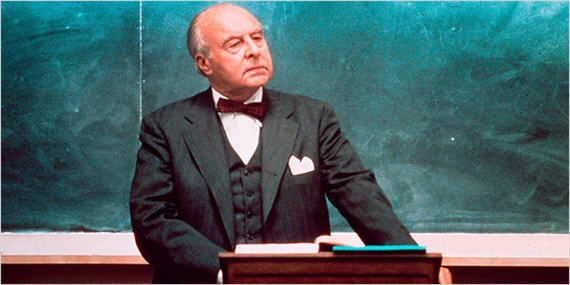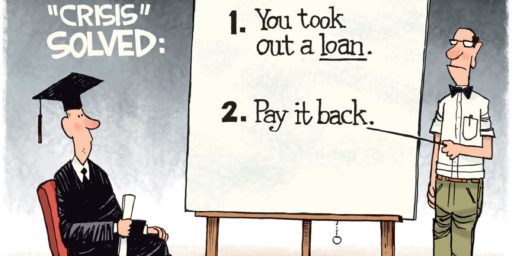College Students Skipping Law School Amid Stagnant Economy
College students finally seem to be listening to the market.
In a post last year, I noted the rather puzzling phenomenon that the slow economy and the even slower market for jobs for law school graduates was doing little to dissaude people from going to law school. Well, it appears that college students finally appear to be getting the message the market is sending. The Minneapolis Star-Tribune notes today that applications to law school are down nationwide, an apparent reaction to a stagnant employment market and reluctance to incur massive student debt:
Law school is no longer a sure bet. Would-be students are noticing.
The swell of students applying to law school — despite growing debt and contracting job prospects — has slowed. Here and nationally, prospective students have read the bad news, are asking tougher questions and, more often, are declining to apply. Applications for this fall to all four of the Twin Cities’ law schools dropped.
Local admissions officers say that’s not a bad thing: The students starting this fall are more “focused.”
“Frankly, for many years, there were many students who went to law school because they didn’t know what to do,” said Cari Haaland, assistant dean of admissions for the University of St. Thomas School of Law. “Now, prospective students are thinking more critically about the decision.”
There’s evidence demand will shrink further. New data show a dramatic 18.7 percent decline in the number of students who took the Law School Admission Test this summer compared to the same time last year.
(…)
During the recession, more people applied to law school, according to the Law School Admission Council. But then for fall 2011, the number of applications nationwide dropped 9.9 percent, according to the council, to the lowest total number in at least nine years. The number of people taking the LSAT also took a dive.
“It is possible that many people took the LSAT then to see if law school would be a reasonable way to wait out the recession,” said Wendy Margolis, the council’s spokeswoman. “But as news about the declining job market for law school graduates spread, fewer people did that.”
On the whole, the four Minnesota law schools saw the same surge in applications, then a similar fall. Applications to the University of Minnesota, the best-ranked of the bunch, rose substantially through 2010-11, then dropped by about 8 percent for this fall, compared with last year. Applications to St. Thomas spiked in 2010, then dropped 29 percent for this fall.
Despite the dip in applicants, this year’s first-year class at the U is the best yet in terms of LSAT scores and GPAs.
“The ones that do apply really want to be there,” said Nick Wallace, the U’s admissions director. “They’re not just applying on a whim or as an escape route from the real world.”
The dip in Summer 2011 LSAT test takers suggests that we’ll see an even larger dip in law school applications next year, although it’s possible that the dip will be made up to some extent when the test it given at other times during the coming year. Nonetheless, there does seem to be a definite trend here away from applying to law school on a whim, which is probably a good thing to begin with. Even so, for those who decide to tough it out anyway, going to law school is no longer the ticket to the easy life that people thought it was:
About 87.6 percent of the class of 2010 had a job — any job — nine months after graduation, according to a June report by the National Association for Law Placement. That’s a 15-year low.
“But you have to remember that students 15 years ago didn’t have the same debt,” Leipold said. “A lot of students have six-figure debt coming out of law school now … so the picture is even bleaker.”
Yet even that 15-year low “conceals a number of negative trends in the job market,” the report says. Only 68.4 of graduates who reported their employment had a job for which they had to pass the bar exam — “the lowest percentage … ever measured.” About 11 percent of those who reported being employed were working part time.
Big-firm jobs “just dried up,” Leipold said. That also contributed to a 13 percent fall in the median pay for recent grads. The national median salary for those who reported working full time was $63,000 for the class of 2010, compared to $72,000 for the class before it.
In part because there are fewer large firms here, new graduates in Minnesota make less than the national median. Minnesota’s median salary for the class of 2010 was $58,500.
The salary numbers are likely a little better in large markets like New York, D.C., and Chicago, but even there the pain that ripped through the Big Firm community during the financial crisis has not fully healed, with many firms not hiring at nearly the same rates that they were five or six years ago. Back in January, the American Bar Association was already telling college students that they needed to be realistic in their expectations about law school, and possibly forego the experience entirely. Since then we’ve heard of a student suing her law school because of allegedly deceptive representations about their placement services, and another attorney who had turned to topless dancing to supplement her income.
As I’ve said before, there are many good reasons for becoming a lawyer, but thinking you’re going to end up with a glamorous job making big bucks and handling important cases isn’t one of them. Neither is the fact that you apparently don’t have anything better to do. Even if you do get a job at the end of your three years of torture, the odds are you’re either going to spend many, many years in a law library doing research for someone else, or you’re going to be working in the nitty-gritty of a small to medium sized firm where there are no glamorous cases and little reason to think you’ll be driving that BMW by the time you’re 28. If that doesn’t work out, you’ll find yourself hanging out your own shingle and spending years trying to build a viable practice, or you’ll end up in a job where having that J.D. doesn’t really matter. And, oh yea, you’ll have a boat load of student debt. If you can live with that, and only if you can live with that, then go to law school.
Or, you could just listen to this four year-old girl:







Fewer lawyers…how is that a bad thing?
I’m hoping we can dissuade my stepson from applying next year. He has no great passion for the law; he’s yet another liberal arts grad who thinks a law school is a ticket to easy money and who has no idea what else to do with himself. I hope the statistics, because he’s not likely to get into a top tier school, and the amount of debt he’d have to carry convince him to look at other career paths.
It’s happening in medicine too. The really bright kids are smart enough to avoid med school.
For 90-plus percent of today’s college demographic going to law school would be a catastrophic mistake; one that would take multiple decades to overcome, if at all. To that end this recent decline in law school applications is a good sign, albeit many years overdue. Hopefully this news will filter out to more and more parents and they’ll be able to dissuade more and more of their kids from diving into the legal quaqmire.
I linked this in the other thread, but there are bits that use law as an example:
My brother sits in a big tower in a major city and makes big bucks and has represented many big names. I don’t envy him, he deserves it. It is tough and there has been cutbacks in the industry. He can make jokes better than I and as he said: “You sit at the conference table each week and they ask you what you did for the corporation (1800 lawyers) and if you don’t offer anything-you are out the door.” “NEXT” While he likes what he does, he talks little about the pressure on him.
68% of them having a job in a field requiring the bar exam isn’t too bad, although that probably conceals some negative trends of its own. I wouldn’t be shocked if a lot of them are “contract attorneys” who get hired on for temp jobs at relatively low pay.
To make matters worse, there is the looming threat of automation. I still remember the NYT article from a year ago talking about new software and automation that greatly reduces the number of attorneys you need.
@Doug Mataconis
That’s a big one. I met a fair number of fellow Political Science undergrads who had no idea of what they were going to do after they got their B.S., and Law School was a default option.
@Fiona
Tell him it’s not too late to change his major. I knew a couple of people who did that, too, and I wish I was one of them.
@Steve Verdon: “Fewer lawyers…how is that a bad thing?”
The economy cannot recover from the Great Recession until each and every job that was destroyed is recreated. I suggest a Keynesian stimulus for young law graduates, such as a law that allows the unemployed to sue employers that didn’t hire them, we’ll call it the Anti-Discrimination Against the Unemployed Act.
@PD Shaw:
Or, a creative writing program for paranoid fantasies.
At three o’ clock in the morning I toss and turn, wake up, and in my dreamlike state, wonder where the bright kids who forgo doctoring and lawyering are going, and what they are doing.
@PD Shaw:
Heh…sure why not. If, according to Bernard Finel, we can build tanks and then dump them in the ocean or build large pyramids that serve no purpose and still get a boost…why not subsidizing lawsuits to put lawyers back to work. It isn’t what you spend the money on, it is the simple fact that money is being spent. My personal stimulus plan will be a $1 trillion dollar subsidy to rubber dog poo and vomit manufacturers. You can never have too much of those two items.
@AustrianSchool:
Medical school may look less and less attractive to young people because of all the government intervention that has been pushing into health care these days. This is also true why so many physicians are retiring at a young age, in their fifties, because of such intrusions into their professions.
@jan:
Doctors and Surgeons still top this salary survey (at $340K/yr).
(Implications for our retirement costs are left to the reader.)
@john personna:
Some professions can vary greatly. Actors on average $64,000 which makes sense, but that leaves out the Brad Pitts. And my brother, a lawyer, probably makes about a million a year.
And I forgot to add, in a small town like mine, a lawyer probably makes around $70,000 a year.
I have still yet to meet an unemployed or underemployed doctor. I am a lawyer and know plenty of under/unemployed lawyers and do advise against law school at this time but not med school or nursing school. Am I missing something? The medical field sure seems a growth industry to me.
@Gerry W.: If that $64,000 average for actors is correct, then it includes the Brad Pitts of the world. Last time I looked, the average annual income for SAG members — from acting, that is — was somewhere around $3,000.
@WR:
Yep, you are correct, my mistake.
Another thing that is interesting is that physician pay seems to be more structured than lawyers. Lawyers vary widely, as well as actors.
I graduated in an upper percentile of a top 10 law school during the up-swing of the dot-com boom, so I had one of those glamourous, high-paying legal jobs working on important matters for clients on the front page of the WSJ. Ain’t all it’s cracked up to be, but then what is.
One thing that struck me during prior downturns I lived through (and heard from my elders about still earlier ones) is how totally screwed an entire generation of law grads could be based solely on the year they happened to graduate, and how that possibility seems never to have occurred to any of them. My observation has been that many people become lawyers because they are risk-averse in a deep way (regardless of whether they have a burning desire to be Perry Mason or just don’t know what else to do with their Renaissance art history degree). It’s not that they thought LS would be a sure path to riches (necessarily), but that they thought a JD bought them lifetime membership in one of the professions (in the way Anthony Trollope would use the word, not the modern “I’m a professional dog walker” sense). It’s wasn’t so much money as stability. “Time and chance happeneth to them all,” much less market forces or the business cycle, wasn’t really part of their calculus, other than something they thought they were avoiding.
Come the dot-com bust, legal jobs were still out there (unlike now), but the quality of experience, and therefore the long-term career path, wasn’t. Those of us who had gotten real experience during the fat years were fine – in fact even more in demand, because those coming up behind had spent their first years doing only scut work, as everyone above them, from senior partners on down, hoarded the real work to prove their own value as revenues fell. A huge majority of the juniors never got work that would make them functionally useful as mid-levels, and their “careers” in the law were over before they began. Those grads obviously were not dimmer or less competent than people graduating 2 years before – the opposite, if anything. But … life isn’t fair, I guess.
I’m relieved to hear the current generation isn’t falling into the same trap, in the same numbers, at least.
ah, Android at Law is up.
Well, I actually enjoyed law school (Virginia 1978), knew why I was going (I was 26 when I started) and, thankfully, graduated debt-free. (Dad paid the in-state tuition, and my wife paid the rent and the meals!) At the time, a reasonable expectation was that a UVa Law graduate would not be rich-as-Croesus rich, but would have a comfortable and secure living after having survived the 6 or 7 year apprenticeship of being an associate at what then was Big Law. Of course, everything has changed since then. My first law firm (Howrey & Simon) just collapsed, my third (a communications boutique) was absorbed by an international law firm, etc. Even at Big Law, the partnership track is 10 years, and you only have a few years as an income partner to develop enough business to be an equity partner, or you’re out on the street . . . at the age of 40. Even then, there’s no guarantees. For the non “national” law school graduates, the prospects are even less attractive. And that’s in good times, which is not where we are today. That said, while my career has been much more turbulent than I expected, it has been rewarding — personally and, to a lesser degree, financially.
There are two dirty big secrets about law school, which have a direct bearing on the cost and, hence, the debt that most graduates end up with: (1) as everyone who has been through it knows, law school is one year too long. The reason law school is three years has everything to do with university politics and nothing to do with need. Most law schools want to award a JD (juris doctor), and the faculty will not permit a two-year program to award a “doctor” anything. That’s why two-year business schools all give a Master’s degree. The second big secret relates to the first: law schools are big profit centers for universities. They don’t cost much to operate — probably even less today with on-line resources displacing the paper library, traditionally a big expense to maintain.
So, I think a two year program should be sufficient to prepare a lawyer for practice. And, for those who don’t want to practice but want to have a solid grounding in how the law works, a one-year program — offering a different degree, of course — would suffice. The two groups could be taught simultaneously, and the recipients of the one-year degree should have the option to return for the additional year to get the degree which allows them to enter practice, if they desire.
And, if I taught at a third-tier private law school, charging what it charges (and being in the DC metro area, you and I know some local examples), I would feel guilty as hell.
@AustrianSchool:
My Dad is a 65 year old cardiologist, and has said that the best and brightest have been forgoing med school for other professions including investment banking. He thinks the increasing government regulations and the accompanying decreasing of Medicare reimbursement will only further the trend.